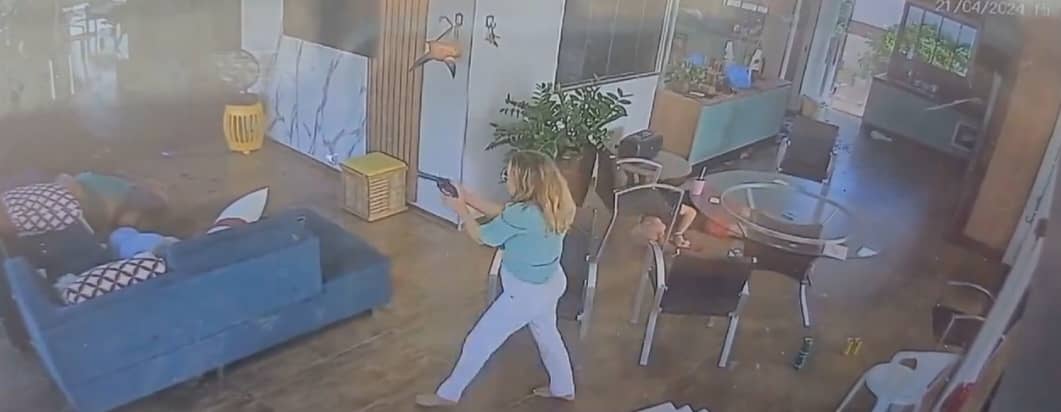SÃO PAULO, Brazil – After drug cartels terrorized the city of Rosario in March, causing four deaths and leading thousands to stay out of the streets in order to avoid threats, President Javier Milei announced he was planning a number of changes in the penal system, including building large prisons, increasing the Armed Forces’ role in combating crime, and transferring facilities to private ownership and control.
Milei’s ideas have not been fully understood yet and he hasn’t given more details on his plans. Observers think, however, that his inspiration is El Salvador’s President Nayib Bukele, whose crackdown on gangs put almost 80,000 suspects in prison over the past two years.
Despite the fact that human rights organizations have accused Bukele’s program of detaining more than 26,000 innocent people and led to 241 deaths inside prisons, the Salvadoran leader became a of model for many in the Latin American conservative wing.
In December, Milei’s Minister of Security, Patricia Bullrich, met with her Salvadoran counterpart, Minister Gustavo Villatoro, in order to “discuss effective strategies in the fight against drug trafficking and the mafias,” as she said on X, which was formally known as Twitter. Since then, Bullrich has said on different occasions that she wants to implement the Salvadoran model in Argentina.
Milei mentioned in interviews in March that he wants to transfer federal prisons located in valuable parts of cities like Buenos Aires to real estate companies, which can develop new projects in those areas and build modern prisons in distant locations without receiving any money from the State. Those would be mega-prisons with a capacity of up to 6,000 inmates.
He also said that his administration has been debating the privatization of prisons in Argentina, something that would be completely new in the South American country’s history.
Milei’s announcements have been received with skepticism by people who know the challenges faced by the Argentinian penal system.
Lawyer María Balbo, a catechist who has been working with inmates for 30 years, said there are no easy solutions for the current problems in the nation’s prisons.
“I’ve been accompanying the decline of the penal institutions over the past decades, and it was possible to see how the economic crisis led to growing violence and crime – and to more people imprisoned,” Balbo told Crux, adding that “too many factors combine to form a complex scenario when it comes to prisons.”
The financial turmoil in Argentina over the past couple of years has deeply impacted the prisons’ conditions, Balbo said, causing them to lack basic items. One of the major problems in the Argentinian penal system is overcrowding, which only made things worse.
According to María Patricia Alonso, a national coordinator of the Prison Pastoral Ministry, complaints involving the poor conditions of the prisons are common in the whole system.
“The lack of food and hygiene items is a recurring issue. Complaints regarding the prisons’ unhealthiness are frequent,” she told Crux.
Alonso said overcrowding has been a problem especially in police stations, which should serve as temporary jails but ended up receiving too many detainees. In the province of Buenos Aires, for instance, there are more than 50,000 detainees arrested in police stations that should house no more than 25,000 of them.
“Police stations are not especially prepared to receive detainees for much time. Many of them take advantage of the chaotic scenario and escape when an opportunity appears, like the shower time,” Alonso said.
Such a problem would not be solved by Milei’s new mega-prisons, where only inmates under federal custody would be accommodated.
Activists like Balbo fear that private penitentiaries may deviate from the original goals of the penal system – the re-education and reinsertion of the inmate in society – and “guide themselves by market values.”
“Given that they are controlled by companies, there would be a risk of subjecting the principles of the system to profit seeking,” she said.
During international meetings of the Latin American prison pastoral ministries, the Argentinian pastoral agents have already learned about the experiences of their colleagues from countries like Brazil, where part of the penitentiaries are managed by companies. In general, private-run prisons tend to be more violent and vulnerable to riots, according to the Brazilian Prison Pastoral Ministry.
“I fear that private institutions could not only be harmful for the inmates, but also for their families, with more restrictions on visits, for instance,” Balbo said.
She noticed that over the past decades the prison population became more and more formed by young men, almost all of them very poor. Many times, the prisoners don’t have formal education.
“We see young men who have never been to a school. In prison, they at times get in touch with formal education and other pedagogical activities,” she said.
Her group has been offering radio journalism classes. Part of that process may be enriched with spiritual values and religious education, something that people like Balbo provide.
“The social abyss between the rich and the very poor will not be solved with more prisons. We need education,” she said.
But even Catholics many times get frustrated with so much violence and say that more and more people should be thrown in jail, Alonso said.
“As members of the Prison Pastoral Ministry, we’re called to struggle for policies that promote the reinsertion of criminals in society and to denounce the violation of their rights. But many people ignore how things work in the system and want easy solutions,” she said.
The challenge for Catholic activists is to build bridges between the prisoners and the society, including with Church segments that are not accustomed to deal with such issues, Alonso continued.
“El Salvador’s model is portrayed as a great answer for all countries. It’s the kind of thing that many people want to hear. But we need to point in another direction and talk about a world where everybody can live in dignity,” she said.

















